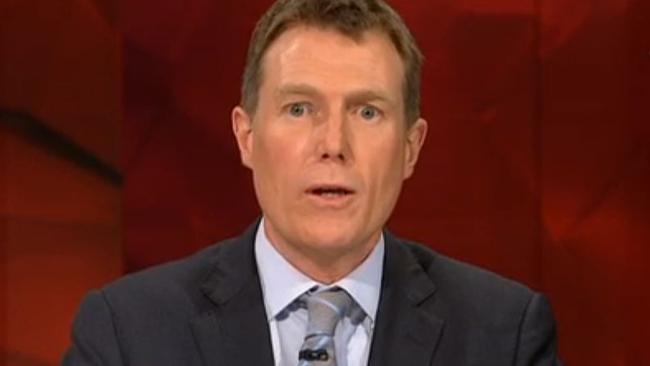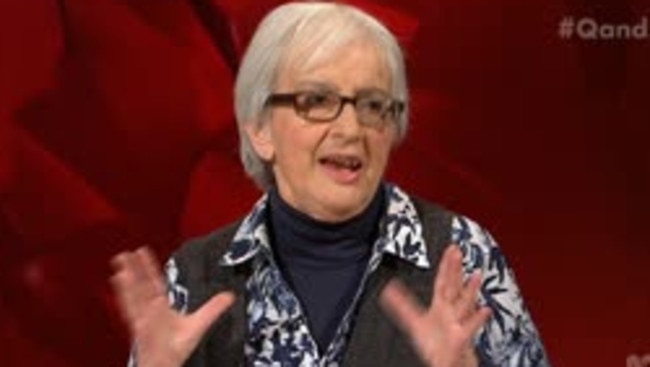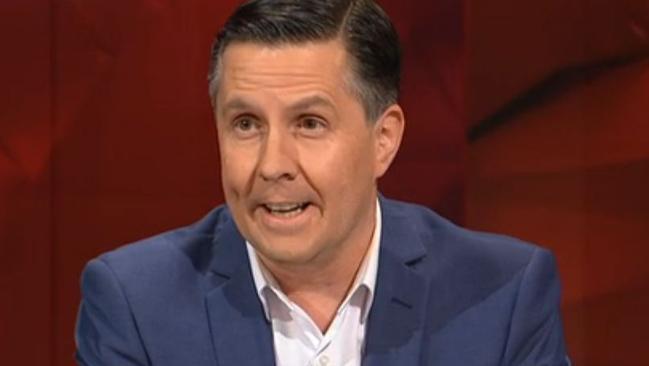‘I don’t want to be seen as a burden on the government’
ROSE Cox, 16, receives just $8 a day caring for her wheelchair-bound mum. When she asked this government minister about it, he struggled big time.
TV
Don't miss out on the headlines from TV. Followed categories will be added to My News.
ROSE Cox, 16, and feminist and social equity analyst Eva Cox share a surname by coincidence.
Last night, they both emerged as the straight-talking elements on ABC’s Q&A.
On a night in which Minister for Social Services Christian Porter talked data sets and figures; Eva Cox delivered succinct zingers and media executive Marina Go managed to get a plug in for Cosmopolitan magazine on the ABC, Rose Cox’s plight grasped the attention of an otherwise policy-bowed audience.
The man charged with welfare reform was never going to have an easy time of it.
As the Q&A panellists discussed Porter’s massive welfare reforms designed to rein in future spending on working age income support payments by “identifying recipients most likely to remain on income support for long periods of time and intervening early”, Rose brought the debate back from figures to real people.

“I’m 16, I’ve started Year 12. At 44 my mum was wheelchair-dependent after a year in hospital with a rare neurological illness. My dad became unwell then, resulting in my becoming at the age of 8 a young carer for my younger sister and family,” Rose said.
“After 26 years of marriage our family unit broke down four years ago, leaving my sister, now 11, and I alone with our mum.
“We provide some sort of care every day, every day and night for 24/7; care includes things like blocked catheters, which are a medical emergency and accidents at night, hydrotherapy ... and household tasks.
“I didn’t ask for this role, I landed in it at a very young age. My young care allowance is $8 a day.”
#QandA If young people getting carer payment are pushed into work, who will do the caring they were doing?
— choosing (@ch150ch) October 3, 2016
$8 a day for a carer is below the minimum wage #qanda
— johnqgoh (@johnqgoh) October 3, 2016
Addressing Mr Porter directly she said: “I don’t want to be seen as a burden on the government, nor do I wish to be welfare dependent for my lifetime. My question, Mr Porter is, how will changes to payments and a blanket policy understand the very unique and often stressful experiences of young carers like myself and my sister?”
Porter’s explanation of how his $96 million Try, Test and Learn fund would mean more personalised attention to individual welfare was longwinded, figure-laden, dataset heavy, and impersonal.
“What we’re trying to do here is understand that inside a carer’s allowance group or a carer’s payment group there are a range of individual stories,” he began, but by the time he had marvelled several times at the revolutionary “data sets” being used to guide the reforms, even Q&A host Tony Jones was steering him back on track.
“So the data set is down to one individual person. So what I’d like to ask is, is your investment approach likely to give more money to someone like Rose, who is now getting $8 a day for all the work that she just described?” Jones asked.
Caring is bloody hard. Respect that by showing that family carers are basically untrained, unpaid nurses. #qanda
— Jonathan Hepburn (@HepburnJon) October 3, 2016
He never really did get an answer. Nor did Rose, who offered some figures of her own.
“I’ve got to juggle obviously my caring responsibilities and education,” she said.
“My education is the most important aspect of my life, because it means that at the end of the day be able to get a job. There’s approximately 105,000 young carers in NSW. We have one of the lowest tertiary education rates because we fall through the cracks.
“And the money that I get on my payment and the money that the Government uses, I think that there must be a better way that you need to do this but the way that you propose, you have no ideas so far.”
“I guess the point is that Government is not the sole repository of every single good idea,” Porter responded, before further outlining the ways the government would consult at grassroots level to see what works.
A girl who can't yet drink legally is doing a full time job keeping her mother alive for $8 per day and Porter has nothing to say #qanda
— Rachel Baker (@astudentnow) October 3, 2016
Finally, Eva Cox jumped in with the first of her zinger summations for the night: “$96 million budget, looking for people to put up ideas the chances of necessarily something happening in Rose’s area is probably fairly small,” she said, to protests from Jones.
“When it comes back out, if you evaluate, I have no particular faith in the fact it will last long enough to be evaluated because someone will abolish it as it goes down. Pilot programs really generally, the experience is, and there’s been many of them, is that actually die on the vine.
“They don’t get picked up. We’ve had so many efforts at it, that it worries me very much.”
“I have no faith in the fact that a small program of pilots like this is ever going to make it into policy because we’ve never seen it happen before.”

The Twitterverse agreed, unhappy about Rose’s plight.
“A girl who can't yet drink legally is doing a full time job keeping her mother alive for $8 per day and Porter has nothing to say,” Rachel Baker offered.
Finally, Porter recovered.
“We have information available to us that has never been before government in the way that it is now. And what it allows us to do is to track programs along. One thing, Rose, is we can’t leave things as they are.”
Eva Cox absolutely right here ... Pilot programs are where policy ideas go to die #qanda
— Ben Eltham (@beneltham) October 3, 2016
The relief was only temporary. Asked by a 60-plus questioner about the fairness of “a person in their 60s, who has worked all their life, but now is crippled with arthritis being denied a disability pension and told to retrain, when “young, fit people, who could work and/or be retrained are getting government payments” Porter again unleashed his figures, until Jones again intervened.
“There seems to be a general point made, that young people should bear the burden of welfare reform, not the old who have worked for a long time and paid taxes do. You agree with that general point? and these people have never paid taxes?,” he asked.
“As a general principle, I think that is fair.”
Again Eva Cox chimed in, to applause.
“When you’re 60 over, your chances of getting a job are zilch because employers don’t easily want you ... if you’re worried about aged things, do something about superannuation concessions which cost us more than the aged pension, rather than banging on about fixing the aged pension,” she said.
So did Porter use evidentiary data sets to ruin the WA economy? #qanda
— Terry (@korstraw) October 3, 2016
Asked to defends the four-week wait for the dole proposal for people under 25 years of age, Porter pointed to a long list of exemptions, but acknowledged “it may place a little bit of strain on family relations and familiar finances for very short periods”.
Shadow Minister for Climate Change and Energy Mark Butler said Labor had rejected the plan last year, and would again. “It is harsh, cruel, unproductive,” he said.
“To be thrown on the scrap heap with no money, is just cruel. It’s beneath us as a country. But the other point is it’s counter-productive. How is that person supposed to get to job interviews if they don’t have money to put petrol in the car, to catch a bus and a train. It saves a small amount of money on the budget. You might doll it up with exemptions and big data again, it’s — just a cruel policy. You should drop it.”

Originally published as ‘I don’t want to be seen as a burden on the government’



